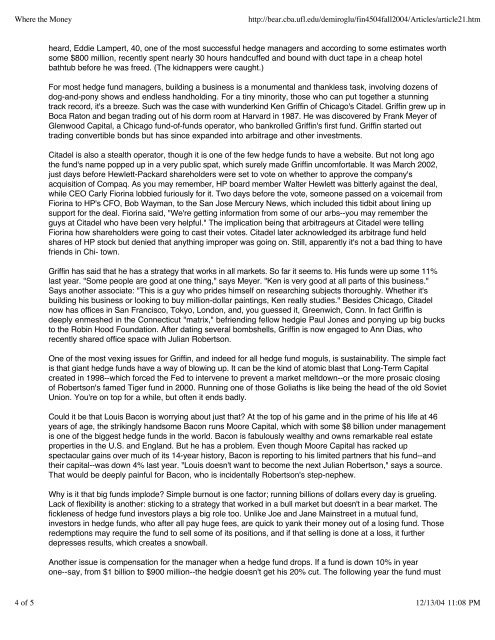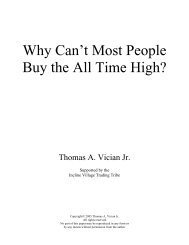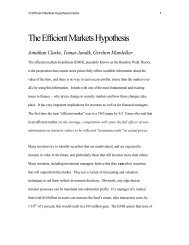Where the Money's Really Made: Louis Bacon - TurtleTrader
Where the Money's Really Made: Louis Bacon - TurtleTrader
Where the Money's Really Made: Louis Bacon - TurtleTrader
Create successful ePaper yourself
Turn your PDF publications into a flip-book with our unique Google optimized e-Paper software.
<strong>Where</strong> <strong>the</strong> Money http://bear.cba.ufl.edu/demiroglu/fin4504fall2004/Articles/article21.htm<br />
heard, Eddie Lampert, 40, one of <strong>the</strong> most successful hedge managers and according to some estimates worth<br />
some $800 million, recently spent nearly 30 hours handcuffed and bound with duct tape in a cheap hotel<br />
bathtub before he was freed. (The kidnappers were caught.)<br />
For most hedge fund managers, building a business is a monumental and thankless task, involving dozens of<br />
dog-and-pony shows and endless handholding. For a tiny minority, those who can put toge<strong>the</strong>r a stunning<br />
track record, it's a breeze. Such was <strong>the</strong> case with wunderkind Ken Griffin of Chicago's Citadel. Griffin grew up in<br />
Boca Raton and began trading out of his dorm room at Harvard in 1987. He was discovered by Frank Meyer of<br />
Glenwood Capital, a Chicago fund-of-funds operator, who bankrolled Griffin's first fund. Griffin started out<br />
trading convertible bonds but has since expanded into arbitrage and o<strong>the</strong>r investments.<br />
Citadel is also a stealth operator, though it is one of <strong>the</strong> few hedge funds to have a website. But not long ago<br />
<strong>the</strong> fund's name popped up in a very public spat, which surely made Griffin uncomfortable. It was March 2002,<br />
just days before Hewlett-Packard shareholders were set to vote on whe<strong>the</strong>r to approve <strong>the</strong> company's<br />
acquisition of Compaq. As you may remember, HP board member Walter Hewlett was bitterly against <strong>the</strong> deal,<br />
while CEO Carly Fiorina lobbied furiously for it. Two days before <strong>the</strong> vote, someone passed on a voicemail from<br />
Fiorina to HP's CFO, Bob Wayman, to <strong>the</strong> San Jose Mercury News, which included this tidbit about lining up<br />
support for <strong>the</strong> deal. Fiorina said, "We're getting information from some of our arbs--you may remember <strong>the</strong><br />
guys at Citadel who have been very helpful." The implication being that arbitrageurs at Citadel were telling<br />
Fiorina how shareholders were going to cast <strong>the</strong>ir votes. Citadel later acknowledged its arbitrage fund held<br />
shares of HP stock but denied that anything improper was going on. Still, apparently it's not a bad thing to have<br />
friends in Chi- town.<br />
Griffin has said that he has a strategy that works in all markets. So far it seems to. His funds were up some 11%<br />
last year. "Some people are good at one thing," says Meyer. "Ken is very good at all parts of this business."<br />
Says ano<strong>the</strong>r associate: "This is a guy who prides himself on researching subjects thoroughly. Whe<strong>the</strong>r it's<br />
building his business or looking to buy million-dollar paintings, Ken really studies." Besides Chicago, Citadel<br />
now has offices in San Francisco, Tokyo, London, and, you guessed it, Greenwich, Conn. In fact Griffin is<br />
deeply enmeshed in <strong>the</strong> Connecticut "matrix," befriending fellow hedgie Paul Jones and ponying up big bucks<br />
to <strong>the</strong> Robin Hood Foundation. After dating several bombshells, Griffin is now engaged to Ann Dias, who<br />
recently shared office space with Julian Robertson.<br />
One of <strong>the</strong> most vexing issues for Griffin, and indeed for all hedge fund moguls, is sustainability. The simple fact<br />
is that giant hedge funds have a way of blowing up. It can be <strong>the</strong> kind of atomic blast that Long-Term Capital<br />
created in 1998--which forced <strong>the</strong> Fed to intervene to prevent a market meltdown--or <strong>the</strong> more prosaic closing<br />
of Robertson's famed Tiger fund in 2000. Running one of those Goliaths is like being <strong>the</strong> head of <strong>the</strong> old Soviet<br />
Union. You're on top for a while, but often it ends badly.<br />
Could it be that <strong>Louis</strong> <strong>Bacon</strong> is worrying about just that? At <strong>the</strong> top of his game and in <strong>the</strong> prime of his life at 46<br />
years of age, <strong>the</strong> strikingly handsome <strong>Bacon</strong> runs Moore Capital, which with some $8 billion under management<br />
is one of <strong>the</strong> biggest hedge funds in <strong>the</strong> world. <strong>Bacon</strong> is fabulously wealthy and owns remarkable real estate<br />
properties in <strong>the</strong> U.S. and England. But he has a problem. Even though Moore Capital has racked up<br />
spectacular gains over much of its 14-year history, <strong>Bacon</strong> is reporting to his limited partners that his fund--and<br />
<strong>the</strong>ir capital--was down 4% last year. "<strong>Louis</strong> doesn't want to become <strong>the</strong> next Julian Robertson," says a source.<br />
That would be deeply painful for <strong>Bacon</strong>, who is incidentally Robertson's step-nephew.<br />
Why is it that big funds implode? Simple burnout is one factor; running billions of dollars every day is grueling.<br />
Lack of flexibility is ano<strong>the</strong>r: sticking to a strategy that worked in a bull market but doesn't in a bear market. The<br />
fickleness of hedge fund investors plays a big role too. Unlike Joe and Jane Mainstreet in a mutual fund,<br />
investors in hedge funds, who after all pay huge fees, are quick to yank <strong>the</strong>ir money out of a losing fund. Those<br />
redemptions may require <strong>the</strong> fund to sell some of its positions, and if that selling is done at a loss, it fur<strong>the</strong>r<br />
depresses results, which creates a snowball.<br />
Ano<strong>the</strong>r issue is compensation for <strong>the</strong> manager when a hedge fund drops. If a fund is down 10% in year<br />
one--say, from $1 billion to $900 million--<strong>the</strong> hedgie doesn't get his 20% cut. The following year <strong>the</strong> fund must<br />
4 of 5 12/13/04 11:08 PM




